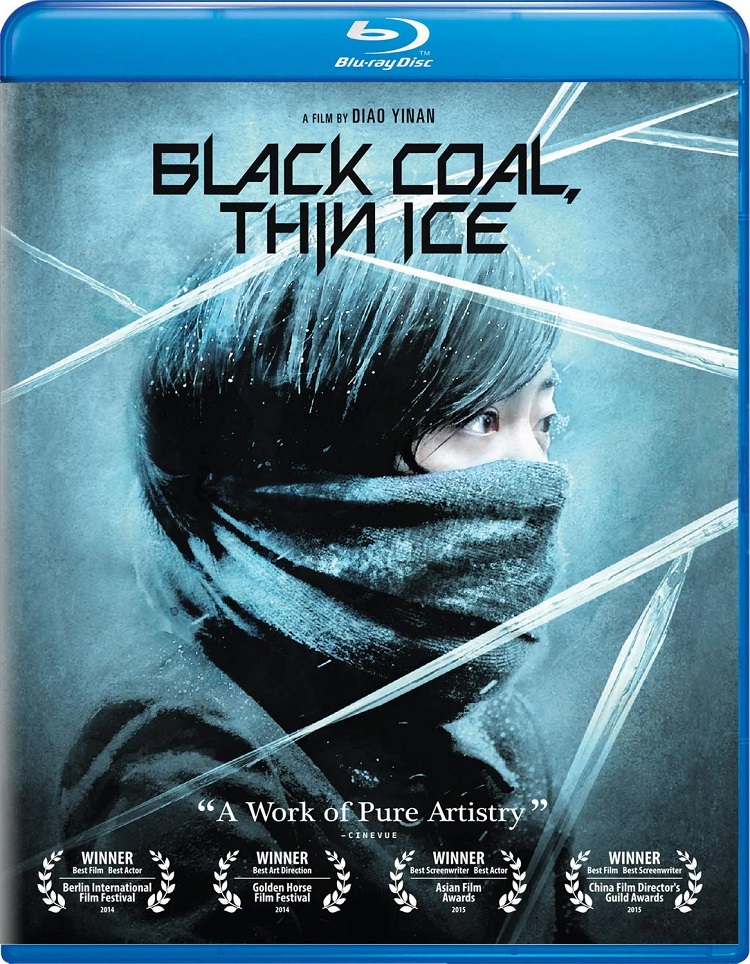
Black Coal, Thin Ice (Bai Ri Yan Huo), a very noir detective story with hints of both humor and nihilism, also provides a glimpse into the run-down, everyday world of a provincial northern Chinese city. Ordinary streets, cramped apartments, bare-bones noodle shops, and slow, creaky trams provide the backdrop to an often confusing murder investigation, leading to a purposely frustrating Sopranos finale-style wrap-up. But if you can go with the flow of the film’s shifting moods and paces, it offers an interesting experience as it riffs on detective stories we’ve all seen before.
The movie starts quickly and stylishly: the first 20 minutes show the discovery of chopped-up body parts in coal delivery trucks, a too-quick investigation by the police, and a stunningly staged botch of an arrest gone horribly wrong. Director Diao Yinan beautifully misdirects the audience to believe the danger is past, then rapidly piles up the bodies in a slam-bang beauty-parlor shootout – all while barely moving the camera from a stationary medium shot.
This fiasco forces detective Zhang Zili (Liao Fan) off the police force and into a private security job, one that he barely bothers to show up for in between drinking and being hung over. But five years after the initial murder, he is awakened and given a shot at redemption when more chopped-up bodies begin showing up in various grisly places. The common denominator is Wu Zhizhen (Gwei Lun-Mei), a pretty, and pretty mysterious, femme fatale.
There’s lots more plot, and I’m still not sure I know who the murderer(s) is/are or what their motivations were. However, like some of the best American noir films, i.e. Howard Hawks’ 1946 The Big Sleep, finding out whodunnit is less important than what happens along the way.
That’s not to say Black Coal, Thin Ice is a totally enjoyable viewing experience. After the opening scenes it slows down considerably, then follows a number of red herrings and narrative dead ends. But throughout, Yinan, who also wrote the screenplay, is masterful at changing moods, using sound (the creak of boots walking on packed snow, the squeak of ice skates in a quiet night) and lighting to convey menace or just plain creepiness.
There’s also a fair bit of horrific humor, much of it generated by the not-too-bright cops trying to crack the case. They are often chasing after the crooks and stumbling as they do so, and not once but twice the failure to handcuff a suspect they’ve arrested has deadly consequences.
The acting is good all around. Liao Fan captures the disgraced detective’s what-the-hell attitude while continuing to propel the plot forward. He ends with a clumsy but spirited dance that has nothing to do with the plot but provides the movie’s theme: in a crazy world, you might as well just dance, or shoot off fireworks during the day. Gwei Lun-Mei is appropriately blank and unreadable, even in moments of passion or pain. She’s a puzzle the men around her just aren’t equipped to unravel. Wang Xuebing as a desperate murderer, Wang Jingchun as a creepy laundry owner and Yu Ailei as an unlucky copy are also standouts.
Black Coal, Thin Ice, in Mandarin with subtitles, was screened at this year’s Tribeca Film Festival and took home the top prize at the Berlin Film Festival. It’s certainly not to everyone’s taste, but it will give you plenty to talk about as you gorge on dim sum afterwards.